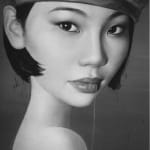

Gabriele Di Matteo Italian, b. 1957
70 7/8 x 59 in
The China - Made in Italy project, by Gabriele di Matteo for Unlimited Art Basel, comes from the awareness that
patenting a single pictorial style is almost impossible such as it is impossible to apply claims related to copyrights
to any artistic imaginary. Since the beginning of his artistic career, Di Matteo has always questioned how the active
presence of the author during the painting process should have a role strongly tied to the manual exercise of the
pictorial practice itself.
Today with China - Made in Italy he tries a piratical “boarding” at the expenses of the new pictorial Chinese wave.
The million worth paintings by Ma Liuming, Zhang Xiaogang, Yang Shaobin, Zhou Tiehai, only to quote some of
the most notorious ones, reflect the booming Chinese economy and its primacies. Gabriele Di Matteoʼs project
enters in this reality to create a short circuit and so introduces a destabilizing element: the author has selected
one hundred of the most significant and famous works of the contemporary Chinese art to reproduce them. The
copies faithfully reproduced in their original size show their nature of fake ones: they are repainted in black and
white.
Depriving the copies of their colours, the artist places a distance from them yet developing a logic of repetition by
which, apart from exploring the significant potential of painting, he sets up a direct dialogue with the ephemeral
and perverse rules of the art market. These works hardly definable neither as copies nor as a postmodern
appropriation, set a series of reflections on the power and autonomy of the originality beside the persuasive
force of art. Another not secondary aspect, underlines the falseness of the reproductions: they do not obey to any
economical logic that determines the price, mainly based on the artistʼs personal quotations, but, nevertheless
their dimensions, they have the same price.
The entire series of works will deliberately be showed referring mainly to the serial production: the paintings will
not be hung on the wall but put one against the other so that visitors will be free to touch and pull them out and
look at them. All the entire installation will remember the interior of one of the many warehouses, containing
counterfeit goods, scattered all over the world.
Nicola Cecchelli

